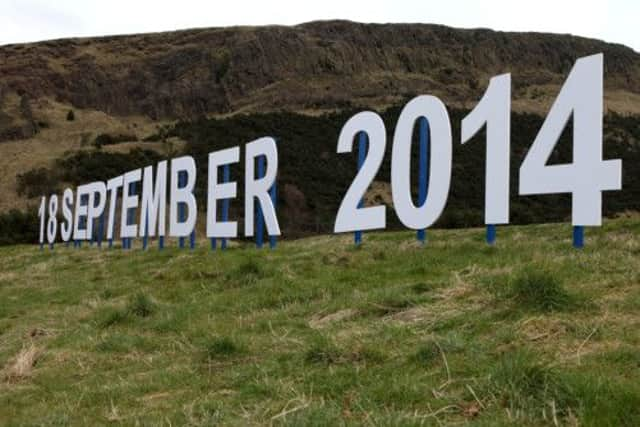Scottish independence: 44% still undecided


Ipsos Mori yesterday released fresh analysis revealing a massive tranche of voters – 44 per cent – have yet to decide.
Nationalists must persuade 75 per cent of this group to back independence if they are to turn around the poll deficit of about 20 points they currently face, analysts said.
Advertisement
Hide AdAdvertisement
Hide AdThe latest analysis prompted both the Yes and No campaign teams to claim there was still “everything to play for”.
The research shows 56 per cent of Scots are certain to vote, with 67 per cent of them planning to vote to remain in the Union and 33 per cent opting for independence, analysts found.
The researchers also found that people in poorer areas of the country are more supportive of leaving the UK.
Analysis of the figures – which are based on Ipsos Mori’s last five polls since the beginning of 2012, showed that 25 per cent of people might not vote in the referendum; eight per cent will vote but are still undecided; and 11 per cent will vote and may change their vote – bringing the proportion of the electorate potentially still up for grabs to 44 per cent.
Mark Diffley, Ipsos Mori’s research director in Scotland, said: “As it looks now, the Yes side would need to capture somewhere between two-thirds and three-quarters of that group in order to win next year.”
The figures suggest a turnout for the referendum of about 75 per cent.
Mr Diffley said the Yes vote was “less solid” than the No vote, with “proportionally more Yes voters saying, ‘I might change my mind’ than No voters”.
Mr Diffley also identified a clear link between support for independence and those living in deprived areas.
Advertisement
Hide AdAdvertisement
Hide Ad“Support for independence is mainly higher, at 50 per cent or more, in neighbourhoods across the Central Belt, some up in Aberdeen and in other pockets of the country,” he said.
“What we find is that areas that suffer from deprivation tend to be areas where you are likely to find support for independence to be at its highest.”
He added: “The likelihood is that these people are less frightened of taking a risk, they are more prepared for significant change – maybe they don’t have a job, they don’t have a
mortgage, they don’t have lots of savings.
“So, our conclusion from that might be that perhaps the offering [from the Yes campaign] could be more radical, because you could pick up more people in those areas.”
There are also concerns among undecided voters over the level of information about the consequences of independence. Mr Diffley said: “I don’t think a lot of the undecideds will be persuaded to vote Yes unless they get some pretty substantial answers to these questions – at least that’s what people are telling us.”
Issues like the future of the NHS, pensions and savings are at the heart of voters’ concerns.
But the “single biggest barrier” at the moment lies in getting the message across that the referendum is not being staged on these specific issues – but on where power lies.
“You’re voting for who should have the levers to make these decisions,” Mr Diffley said.
Advertisement
Hide AdAdvertisement
Hide AdBut both sides could face a problem engaging the wider population who see the current debate as a “shouting match” between the two sides at the helm.
“They see it as being very shouty, very noisy, and they’ve not reached the stage where there’s enough information for people to sit down and read a bit of analysis and come to a conclusion,” Mr Diffley added.
The good news for the Yes side is that its figurehead, First Minister Alex Salmond, remains “way ahead” of other party leaders in the popularity stakes, despite six years in government, although analysts said this has “slid a bit” recently.
The Ipsos Mori analysis follows comments from US statistician Nate Silver who said the Yes campaign has ‘’virtually no chance’’ of winning the 2014 vote. Mr Diffley said Ipsos Mori’s analysis suggested the referendum result was “not quite as cut and dried and as simple as [Mr Silver] was making out”.
A spokesman for Yes Scotland said: “As Mark Diffley, the research director of Ipsos Mori Scotland pointed out, there is everything to play for in this referendum. The two most recent polls, both carried out by Panelbase, for The Sunday Times, show that at this stage of the campaign a swing of under five per cent is needed to put Yes ahead.
“Nonetheless, we know from various polls, as well as our own research, that large numbers of voters have yet to decide and that the more people learn about independence, the more likely they are to vote Yes.”
Better Together, the official pro-Union campaign, said it is still fighting for every vote.
“There is all to play for in the referendum and anyone who thinks that either campaign has this sewn up is playing a very dangerous game,” a spokesman said. “There are thousands of people in Scotland who have yet to make up their minds.”